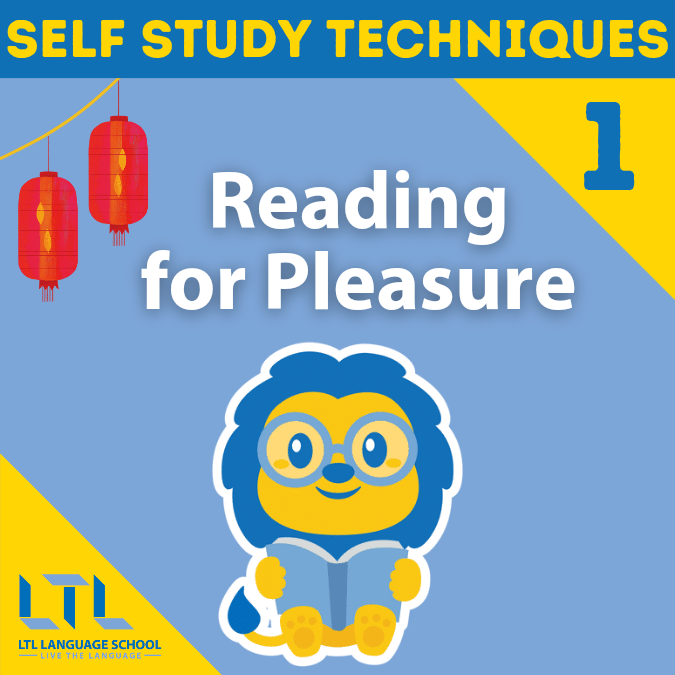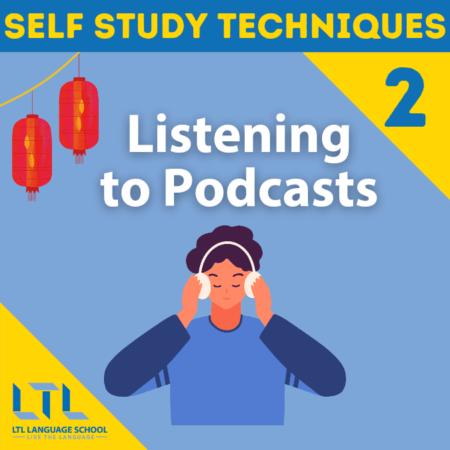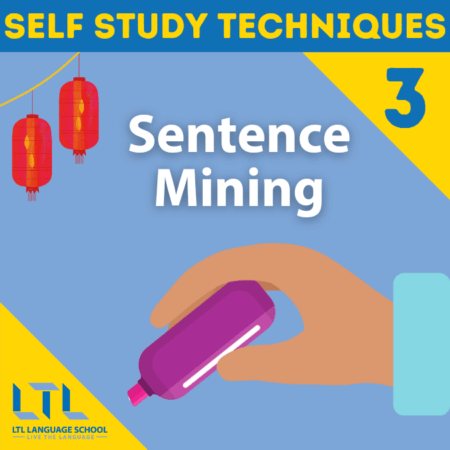Mastering a Language Solo: 4 Tried and Tested Self-Study Techniques for Language Learning
Mischa Wilmers is a fluent Chinese speaker and educator from the UK who runs the blog and podcast I’m Learning Mandarin. He is also the co-founder of Mandarin Retreat, an organisation that run immersive weekend trips and extended five day extended camps for Chinese learners based in Europe. In this series of blogs he offers his best insights and tips into how to improve your Chinese learning efficiency.
For anyone whose goal is to achieve fluency in Mandarin Chinese, taking classes is an excellent first step.

However, as all of the most successful learners will attest, classes on their own will not make you fluent.
While they may provide a solid foundation, it’s essential to dedicate time outside the classroom to reinforce what has been learned and immerse yourself in the language.
However good your course and teachers are, self-study is a crucial component of language acquisition and a key predictor of your success.
In this blog, I’ll introduce four effective techniques you can use outside the classroom, drawing on my own experience of reaching fluency in Chinese and organising immersive language learning camps with my organisation Mandarin Retreat.
Following these tips will supplement your Chinese classes and massively speed up your journey towards fluency.
Let’s get started!
Mandarin Self Study Techniques || Reading for Pleasure
Mandarin Self Study Techniques || Listening to Podcasts
Mandarin Self Study Techniques || Sentence Mining
Mandarin Self Study Techniques || Language Exchange
Mandarin Self Study Techniques || FAQs
Mandarin Self Study Techniques || Reading for Pleasure
Reading is an excellent way to expand your vocabulary, improve your comprehension skills, and immerse yourself in the Chinese language.
Studies have shown it’s also one of the most effective ways to increase your passive vocabulary.
The best way to improve your reading skills is to read more often and the best way to read more often is to establish a daily habit of reading for pleasure.
For beginners and intermediate, graded readers are a fantastic resource that offers compelling stories tailored to your language proficiency level.
These books introduce new characters gradually, making it easier to follow along and enjoy the reading experience.
Additionally, you can explore interesting articles online using tools like Zhongwen Popup Dictionary, a browser extension which allows you to hover over Chinese characters, providing instant translations and explanations.
By incorporating reading into your self-study routine, you’ll reinforce grammar structures, learn new vocabulary, and develop a deeper understanding of the language.

Basic Mandarin 📣 105 Simple Phrases To Make Your Life Easier
Basic Mandarin Phrases – Learn the Chinese greetings and other basic phrases in minutes with our pocket guide for Chinese beginners,
Mandarin Self Study Techniques || Listening to Podcasts
Podcasts are an invaluable resource for improving your listening comprehension and familiarising yourself with informal Chinese conversations.
Find podcasts that align with your proficiency level and listen to them while performing daily tasks like doing chores or walking to class.
At any given moment if you’re not performing a task which requires your undivided attention you could be listening to a podcast.
Over time you can clock up hundreds of hours of listening, helping you to gradually acclimatise to the natural flow everyday spoken Chinese.
My favourite podcasts to listen to involve two or more native speakers chatting about a topic I’m interested in. For intermediate students Da Shu Zhongwen and Talk to me in Chinese are two excellent options which follow this format.
Don’t expect to understand everything at first.
Choose a podcast which you can understand the gist of and are compelled to understand more of.
You’ll be exposed to colloquial expressions, slang, and cultural nuances commonly used in everyday conversations. It will also help train your ear to improve your pronunciation.

42 Brilliant Chinese Podcasts to Improve Your Chinese Skills
Love listening to Chinese podcasts? We’ve got 42 we think you’ll love then. We cover all levels so there is something for everyone.
Mandarin Self Study Techniques || Sentence Mining
Sentence mining involves collecting sentences that you find useful or interesting for your own conversations.
These sentences can be sourced from podcasts, your Chinese classes, or conversations with native speakers.
Each time you come across a sentence you think you might want to use yourself, write it down and store it using a personalised database or spaced repetition system such as Anki.
👉 When mining sentences, focus on capturing common sentence patterns or idiomatic expressions.
With regular practice, your active recall of vocabulary and sentence structures will improve, allowing you to communicate more fluently and accurately.
Make it a habit to review and revise your sentence mining collection with Anki every day, ensuring long-term retention of what you’ve learned.
For a more detailed explanation of how to use the sentence mining technique most effectively check out this blog.
Mandarin Self Study Techniques || Language Exchange
Practicing with a language exchange partner provides a valuable opportunity to apply what you’ve learned in class and strengthen your conversational skills.
Seek out native speakers who are learning your native language, allowing you to engage in language practice.
Wherever you’re based, you can easily find native speakers who are willing to help you with language exchange by searching Facebook and Meetup groups in your local area.
Two language apps which can facilitate language exchange include Hello Talk and Tandem.
During your language exchange sessions, focus on using the sentences you’ve mined and incorporate them into your conversations.
Native speakers can offer guidance, correct any mistakes, and provide alternative ways of expressing certain ideas. Be sure to take notes on the corrections and revisions, and use Anki to review and reinforce the corrected phrases or sentences regularly.
Overall, supplementing your Chinese classes with effective self-study techniques is essential for language acquisition and fluency.
By immersing yourself in the language outside of the classroom, reinforcing what you’ve learned, and actively applying it in conversations, you will accelerate your progress and increase your confidence in using Chinese in real-life situations.




For more on all things China, don’t forget to check out our latest posts:
- Chinese Radicals | Unlock Their Potential and Crack The Code (FREE PDF, Poster AND Quiz Included)
- Chinese Measure Words 🤔 71 Frequently Used (With Free PDF, Video and Quiz)
- Top 100 Most Common Chinese Characters – With Examples!
- Wedding Customs in China 👰 Time-Honored Traditions & Modern Trends
- 4 Ways to Create an Immersive Learning Environment When Living Outside of China
Mandarin Self Study Techniques || FAQs
What are the best self study apps for learning Chinese vocabulary?
We’d definitely recommend the spaced repetition flashcard app, Anki.
DID YOU KNOW we not only have pre-made Anki decks available in simplified AND traditional Mandarin, but also in Japanese, Korean and more! Check out our decks here.
How can I find a language exchange partner?
For face to face meetups, try searching Facebook and Meetup groups in your local area. For online chats, two language apps which can facilitate language exchange include Hello Talk and Tandem.
But remember, take appropriate safety precautions when communicating with strangers!
How can I stay motivated to self study outside of lessons?
To stay motivated, set specific goals, break them down into smaller milestones, and track your progress. Additionally, find ways to make language learning enjoyable, such as incorporating engaging resources like movies and TV Shows, practicing with native speakers, or immersing yourself in the culture.
How can I have a more immersive Chinese language experience?
Perhaps the immersive Chinese language experience you can have is living with a Chinese family in China! Take a look at our homestay options and see which city is right for you.
Want more from LTL?
If you wish to hear more from LTL Mandarin School why not join our mailing list?
We give plenty of handy information on learning Chinese, useful apps to learn the language and everything going on at our LTL schools.
Sign up below and become part of our ever-growing community.
BONUS | Learn Chinese with LTL in person. Our student community is growing by the week.
⭐ Download our free ebook, your starter pack of essential Mandarin learning resources!


 Hi, my name is Ilaria! I am from Italy and I am a Student Advisor at LTL. Fancy coming to study with us in China? Drop me a message.
Hi, my name is Ilaria! I am from Italy and I am a Student Advisor at LTL. Fancy coming to study with us in China? Drop me a message.







